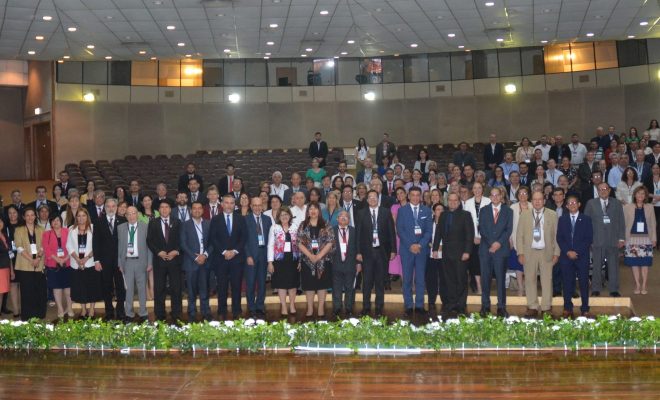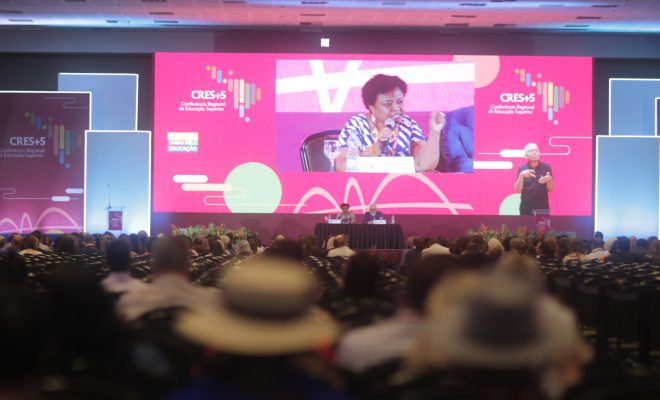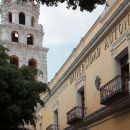Declaration of Asunción urges higher education systems to strengthen their commitment to technological innovation to reduce gaps

On 22 and 23 November at the National University of Asunción in San Lorenzo, Paraguay (UNA), rectors participating in the 10th Meeting of Higher Education Networks and Councils of Rectors of Latin America and the Caribbean (RedES), representatives of the Latin American and Caribbean Higher Education Area (ENLACES) and UNESCO-IESALC met to discuss, analyse and debate as university, institutional and regional actors, the advances and challenges of the digital transformation in higher education with a view to the future of their institutions and within the framework of sustainable development.
The 10th RedES Meeting focused on one of the main opportunities for the transformation of higher education in these times: digitalisation, whose impact encompasses all spheres of action of universities and whose rapid progress represents major challenges.
This edition of the networking meeting is the first to be held in person after the pandemic. Organised by UNESCO IESALC, together with the National University of Asunción (UNA), ENLACES and the Association of Public Universities of Paraguay (AUPP), it is part of the preparatory process for the Follow-up Meeting of the CRES (Regional Conference on Higher Education) to be held in Brasilia in March 2024, known as CRES+5.
The nearly 200 participants from 13 countries assessed the current challenges for academic processes, taking into account the emergence of generative artificial intelligence and the integration of web-based educational platforms, which present both opportunities and risks.
Participating in the inaugural talks were Zully Concepción Vera de Molinas and Miguel Torres Ñumbay, rector and vice-rector respectively of the National University of Asunción; Clarito Rojas Marín, president of the National Council for Higher Education (CONES) and rector of the National University of Concepción (UNC, Paraguay); Francesc Pedró, director of UNESCO IESALC, as well as rectors from different Paraguayan universities, representatives of university networks and interested members of the public.
Among the advantages offered by digitisation, experts noted that new technologies can be used to tailor learning to the individual needs of students, which can help improve their performance; they can facilitate access to education for those living in remote areas; and innovation, both in teaching and learning, can develop engaging content adapted to the needs of the moment.
Participants acknowledged the undoubted potential of technology integration in higher education, while recognising the challenges it presents in terms of equity and quality. Implementation can be costly and may not be accessible to all institutions, which could exacerbate existing inequalities. Hence the need to counteract or address existing digital divides through public policies for digital transformation that favour the most vulnerable students and treat connectivity as a common good, a public good and a universal right, underlining the need to incorporate a gender perspective to avoid new divides and inequalities.
On the other hand, they highlighted the need to establish public policies that support the development of new technologies, the continuous training of teachers and the promotion of research in the area and the promotion of integration through these tools, with benefits for the entire university community and, above all, placing educational innovation, open and distance education programmes and hybridisation at the service of the most vulnerable and including technical, administrative and service staff as beneficiaries.
They unanimously expressed their rejection of the commodification of data as a funding mechanism for digitisation, calling for the ethical use of data and data privacy.
They collectively expressed the need for higher education institutions to commit to sustainability as part of the digital transformation and within the framework of institutional policies that facilitate the use of renewable energy and the recycling of equipment.
Regarding the use of artificial intelligence in higher education, higher education institutions are called upon to promote research on artificial intelligence and the training of the human capacities required for its use, including technological and ethical aspects, but also in terms of aspects that favour the quality of higher education.
A call was made to the governments of the region to reinforce their commitment to the financing of quality higher education that respects university autonomy, decent working conditions and academic freedom.
Finally, the Networks acknowledged UNESCO IESALC for convening and organising this 10th Meeting and thanked the National University of Asunción and its authorities for their support and invaluable welcome and shared leadership for the success of this event.
The final conclusions and recommendations are contained in the Declaration of Asunción.
Achievements of remote emergency education
The Director of UNESCO IESALC, Francesc Pedró, highlighted four key achievements of emergency remote education mentioned by panellists and the public during the debates: the first was the enormous response capacity and commitment of higher education institutions during the pandemic: “I think it was an act of heroism and we did not capitalise enough on it”. The second achievement goes beyond technology and refers to the recognition of the necessary professional competence of teachers.
Visibilisation of the difficulties of women’s academic careers in comparison to men, not only in terms of access and success in academic careers and access to positions, is the third achievement, while the fourth relates to the recognition by universities that students are not just learners or future workers, but are people who require holistic care. “This translates into an awareness on the part of universities that they need to increase their efforts to provide care services to students and teachers.
A final lesson relates to the increasing emphasis on the perspective of student welfare as a human being who must not only be trained as a future professional or researcher, but must also be treated as a human being who has, like everyone else, socio-emotional and effective needs”, he said.
Live streaming November 23, 2023
Documents
Related posts
In the News
- Tendencias de la Educación Superior en el mundo y en América Latina y el Caribe – Podcast de EAD FPUNA vía YouTube
- Representantes de REDES elaboraron la Declaración de Asunción para una educación superior sostenible y digital – UNA
- Director de UNESCO valora excelencia educativa de la UNA | Radio Educa
Leave a reply
You must be logged in to post a comment.








